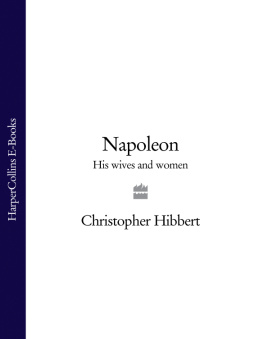1
THE CREOLE
She longs to see Paris and has
a very sweet disposition.
CONTRARY TO OUR HOPES, it has pleased God to give us a daughter, Rose-Claire Tascher de La Pagerie wrote after the birth of her first child on 23 June 1763. The babys father, Joseph Tascher de La Pagerie, had wished for a son who might, as he himself had done, obtain a post as a page at court at Versailles far away from the familys sugar plantation on the West Indian island of Martinique. The mother had hoped that the birth of a boy might reconcile her husband to a marriage which was not a happy one, and which led him to seek such pleasures as could be found in Fort Royal, the capital of Martinique, where he was known to spend much of the day playing cards and was believed to spend the nights in bed with his black mistress.
In his plantation he took scant interest. His father had sailed out from France in 1726, having high hopes of making his fortune as so many Creoles West Indians of European descent contrived to do. But he was not a successful planter. Nor was his son and, by the time his grandchild was born, the plantations profits had fallen sharply, while the number of slaves, once as many as 150, summoned to work at half-past five every morning, had fallen to less than fifty.
These slaves, and the La Pagerie family, had all sought shelter in a stone-walled wind-house on the night of 13 August 1766 when devastating gales and a tidal wave tore across the island, killing over four hundred people, sweeping away the familys mill and slave quarters and all the other wooden buildings of the plantation, and flattening the sugar canes, the mangoes, custard apples, tamarisks and bread-fruit trees.
The La Pageries large wooden house was not rebuilt and the upper floor of the refinery, above the clanking machinery crushing the sugar canes, became the three-year-old Roses home. Seven years later, after her mother had given birth to three more girls, Rose was sent to a convent school in Fort Royal where she was taught how to behave as a young lady would have been expected to behave in France, how to dance and sing and play the piano, how to use a fan and conduct a polite conversation; but to academic instruction not so much importance was attached.
When she was fourteen, Rose left the school at Fort Royal, and eagerly looked forward to leaving Martinique for a more exciting life in France. The opportunity to do so had been given to her by her aunt, Dsire, the mistress of a soi-disant marquis, Franois de Beauharnais, who had been appointed Governor of Martinique and of several nearby islands. Having, for proprietys sake, married one of Franois de Beauharnaiss aides, Alexis Renaudin who had thrashed her savagely when he discovered her notorious conduct with the Governor and who had returned home to obtain a legal separation Dsire followed him to France in order to enter a counter-plea and obtain a share of his money. Soon afterwards, Franois de Beauharnais and his wife also sailed for France, where Mme de Beauharnais went to live in the country on her familys estate while her husband settled down in Paris with his mistress, Dsire Renaudin.
Dsire now set about arranging a marriage between one of her nieces in Martinique and her lovers son. She accordingly asked her brother Joseph and his wife to send over from Martinique at least one of their daughters as a bride for Alexandre, then sixteen and a half years old. Alexandre thought that the second of the La Pagerie daughters, Catherine, aged twelve, would probably suit him best after a suitable Paris education; but Catherine died of tuberculosis before this could be arranged. Since her sister Rose was considered, at fourteen and a half, too near Alexandres own age, the youngest daughter, Manette, was then proposed. To be overlooked in this way was too much for Rose to bear. Usually so biddable and languorous, so lazily placid, she burst into frequent floods of tears until her father wrote to Alexandres family:
The oldest girl, who has often asked me to take her to France will, I fear, be somewhat upset by the preference given to her younger sister. She has a very fine skin, beautiful eyes, beautiful arms and an unusual gift for music. She longs to see Paris and has a very sweet disposition. If it were left to me I would bring the two daughters instead of one, but how can one part a mother from both her remaining daughters when death has just deprived her of a third?
So, in September 1779, Britain having declared war on France the year before, Joseph Tascher de La Pagerie, his daughter Rose, and a freed slave named Euphmie, sailed for Europe in the le de France. After a fearful, three-month-long crossing of the Atlantic in appalling weather, constantly threatened with interception by the English fleet and in danger of capture by pirates, M. de La Pageries weary party landed at Brest, where he immediately went to bed to await the arrival of his sister, Dsire, who, accompanied by his future son-in-law, Alexandre de Beauharnais, set out from Paris as soon as she heard that the le de France had docked.
Alexandre was not disappointed by the appearance of his intended bride, shaken though she was by the tossing of the le de France in the Atlantics rough waters. Mademoiselle de La Pagerie may perhaps appear to you less pretty than you had expected, Alexandre reported to his father, but I think I may assure you that her amiability and the sweetness of her nature will surpass even what you have been told about her. He was not, however, so taken with the girl, now sixteen years old, as this description implied. She seemed good-natured, admittedly, but gauche and rather fat; and he might well have rejected her had it not been for the annoyance his rejection would cause his godmother, Dsire, who had been so kind to him since his mothers death.
As for Alexandre himself, he was certainly a handsome young man, self-assured in his army uniform; proud of the title of viscount and of that of marquis which had by now been officially conferred upon his father; attractive to women, despite a pompous, sanctimonious manner; and already highly satisfied to have been the lover of several ladies of whose names and ranks he made lists to indulge his vanity one of them, who bore him a son, being the satisfactorily aristocratic comtesse Laure de La Touche de Longpr.
As well as being socially pretentious Alexandre de Beauharnais was also an intellectual snob, inordinately proud of having shared a tutor with the nephews of the duc de La Rochefoucauld, the writer and social reformer, by some of whose views he had been influenced without sharing those which might have damaged his standing in society.
Not long after Roses arrival in France, on 13 December 1779, she and Alexandre were married. He than returned to his regiment in Brittany, came back to Paris for a few days and, later in the month, left Rose to go back to Brittany again.
2
THE DOOMED MARRIAGE
Kindly take yourself off to a convent.
ROSE SEEMED QUITE CONTENT. She was as delighted as she had expected to be with Paris where she lived with her aunt Dsire and Dsires lover, the marquis, in the ancient part of the city in the rue Thvenot. Admittedly, it was a cold and draughty house, the rooms of which were cast into an unalleviated gloom by the tall houses on the other side of the narrow street, and often rendered noisomely offensive by the stench of the nearby tanneries and the effluent and pieces of skin and streams of blood from the butchers stalls pouring sluggishly down the kennel. But, in these early days of her marriage, Rose does not appear to have been distressed by the discomfort of the house in the rue Thvenot; and even when her ambition of going to court at Versailles was denied her because of the dubious nature of the title which her husband had assumed, it was he rather than herself who was the more indignant in their shared disappointment.












